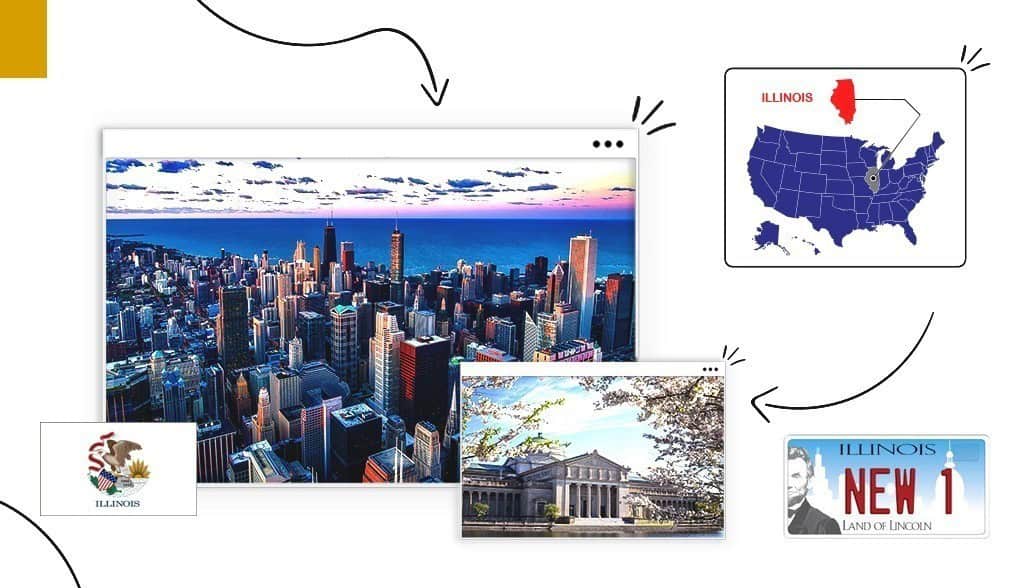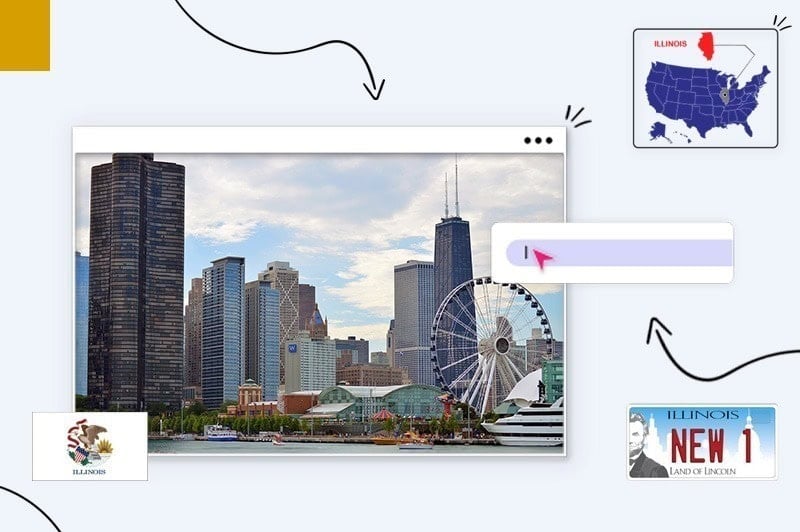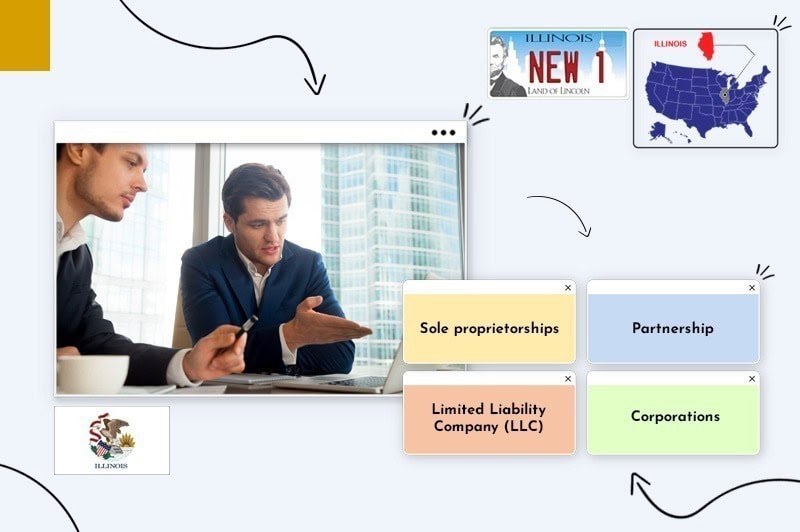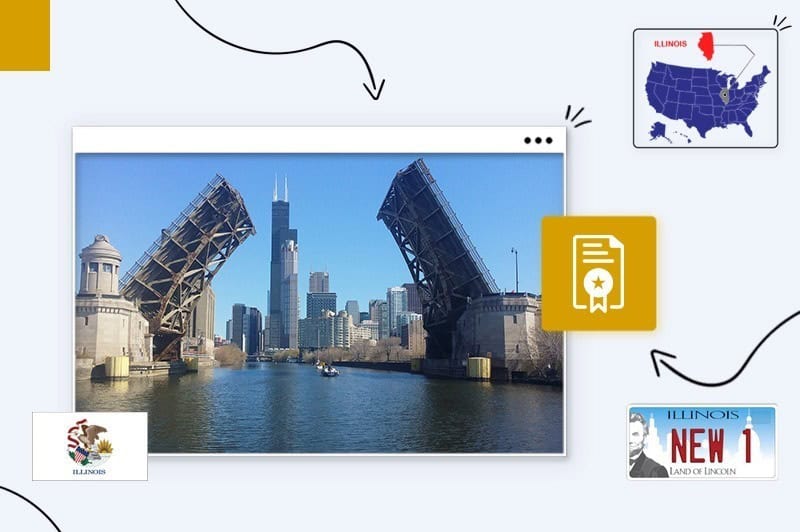
Home » How to Start a Small Business » Start a Business in Illinois
Illinois is home to the first McDonald’s, Route 66, deep dish pizza, and 90% of all US pumpkins.
So, there’s a lot to love about the land of Lincoln.
But is it any good for business?
With living costs lower than the national average, a 4.95% flat income tax rate regardless of income level, and 80% of Illinois start-ups surviving beyond their first year, the Prairies state offers start-ups a strong economy to do business in.
Starting a business can seem daunting, especially if you’re planning your first steps. We created this guide to help you navigate the first steps of planning your dream business with ease.
Here’s everything you need to know about how to start a business in Illinois:

Your goal as an entrepreneur is to identify a market niche with a problem, create a product or service, and provide a profitable solution.
Here’s how it looks:
Airbnb, Uber, and Netflix show how simple solutions can solve global problems. Okay, these are big examples. But a small idea can become a billion-dollar business when it solves a common problem, like Spanx.
Today Spanx sells in over 50 countries and is worth $1.2 billion.
You can do the same by fine-tuning your business idea to determine its demand and viability, beginning with:
Sara Blakely played to her strengths by using her innate talent to solve a problem.
You could too.
Consider your passions, interests, professional expertise, skills, knowledge, and experiences. Do they combine and make a recipe for a great business idea?
Can you use them to solve a common problem and provide value to the Illinois community?
Let’s look at some popular Illinois business ideas:
It makes sense for future Illinois brick-and-mortar business owners to choose a niche popular with the locals.
To cater to local interests, embrace the local flair by exploring its vibrant communities, cultural heritage, and regional specialties, then incorporate them into your business idea.
Some Illinois business ideas include:
Let’s say you have a business idea; now, you must validate it to confirm the demand for your solution, how much people will pay for it, and what it’ll cost to enter the market.

A business plan helps unlock your idea’s potential by outlining your goals and choosing strategies to achieve them. And it also communicates your vision to potential investors who can help make it a reality.
You’ve two business plan choices, a traditional and a one-page plan, but both include the following critical elements:
Market research helps you gain insights into your target audience’s preferences, analyze your competitors, and evaluate the potential demand for your products or services.
A financial plan analyzes your start-up costs, pricing strategies, revenue projections, and economic forecasts to determine whether your business idea is worth your investment.
And any business that requires funding will need a financial plan to secure it.
A marketing plan outlines strategies and tactics to promote your brand awareness, differentiate it from competitors, reach your target audience, and drive customer engagement.
Your key marketing strategies include branding, advertising, and your online presence, like your website and social media platforms.
Pro tip:
You can begin with a one-page business plan using a free template and upgrade to a traditional one when you need funding.
Your location can make or break your business, especially if your niche relies on ‘walk-in’ traffic from the street, like food or retail.
So, looking for popular city neighborhoods or districts like Chicago, Springfield, or Peoria that match your target market and industry is important.
But other considerations come into play when choosing the perfect location for your new business, such as:
Research Illinois zoning regulations as they decide which types of businesses are allowed where and any special requirements or limitations.
Make it easy for people to visit your business and ensure there are nearby highways, public transportation, and parking. Also, consider how visible your business will be from the street to attract potential customers.
Choosing a location that aligns with your target market increases your chances of attracting and keeping customers. Research the area’s demographics to confirm it matches your target audience and has adequate population density and income levels.
Look at similar businesses in your chosen location and see what they offer and their reputation to determine if there’s room for your brand to stand out.
Consider utilities, internet access, and your location’s infrastructure to ensure it’s right for your brand. Also, take note of nearby amenities such as shopping centers, restaurants, and entertainment venues, which can attract customers and enhance the appeal of your location.
Brick-and-mortar businesses are more expensive to start than most online ventures, as it removes location from your start-up costs.
If you can begin online and expand to a physical location as your business grows, that’s a bonus for your bottom line.
For an online business:

Your business name plays a significant role in establishing your brand identity. It must resonate with your target audience, convey the essence of your business, and comply with Illinois requirements.
Consider the tone and personality you want to project to create a memorable and distinctive name.

There are two types of business structures: informal and formal.
Informal structures are sole proprietorships and general partnerships; formal structures are LLCs, limited partnerships, and corporations.
Your structure choice depends on the type of business you want to start, whether you’ll have employees, and your risk appetite!
Let’s look closer so you can choose the right structure for your business:
For further information on which business structure you should choose, check out the Illinois Department of Commerce’s step-by-step business guide.
Check out this guide about LLC taxes for a deep dive into navigating your business’s taxes. Creating a smart tax plan is key for business success.

Most businesses need three things to run smoothly: business banking to separate finances, credit cards for additional credit lines, and accountants to ensure IRS tax compliance.
All three offer different advantages and have certain regulations in Illinois; here’s what you need to know:
Entity owners (like LLCs and LLPs) need separate business bank accounts to avoid breaking the corporate veil (mixing business and personal finances), which can lead to losing liability protection.
While general partnerships and sole proprietors can trade without a business account, using one simplifies bookkeeping and adds credibility to their brand.
To open a business bank account in Illinois, you might need the following:
Often an essential credit line for many small business start-ups, you can use them to build your business credit history score.
You’ll need a favorable personal credit score to get a business credit card in Illinois, and some card suppliers also require proof of income.
New business owners who can’t get a credit card can opt for a secured business credit card, which requires a deposit as collateral.
Good accounting and bookkeeping are essential when running a business. An experienced Illinois accountant can ensure you comply with all state requirements and accountancy software or apps for your daily bookkeeping needs.
Visit the Illinois Department of Revenue website for information on Illinois tax policies.

All businesses require funding from family and friends, banks, or other alternatives.
Let’s look at your Illinois funding options.
The first place many small businesses look for loans is the Small Business Administration, which backs loans with longer repayment times and lower interest rates.
Loans include:
Contact the Small Business Administration in your area to find out what’s available.
Illinois offers grants and loans to support small businesses in certain industries, including:
Angel and VC investors offer alternative ways for small businesses to access funding.
VCs invest in larger businesses in exchange for a percentage of ownership and control over how the company runs. In contrast, Angel investors invest in smaller firms to help them start. They typically receive a percentage ownership, but generally take no part in running the business.
Illinois VC and angel investor options:
When choosing a loan, consider the repayment terms to ensure you can afford it, and with Angel and VC investors, be sure that what you’re gaining is worth what you’re giving away.
Insurance is crucial in safeguarding your Illinois business and provides financial protection against unexpected events and liabilities. And as with all states, Illinois has specific insurance regulations:
You can learn more about Illinois insurance requirements via the Illinois Department of Insurance.
Other business insurance policies that many small businesses need include:
Pro-tip:
To ensure compliance with Illinois insurance regulations, consult an insurance professional familiar with the state’s requirements.

Illinois does not issue a state-level business license. Still, local municipalities often require a business license or permit before you can operate in the state.
You can find what licenses and permits your business might need on the Illinois First Stop Business Information Center.
Business taxes come in multiple forms, and which you’ll pay depends upon your business structure, industry, location, and whether you have employees.
Most business owners pay the IRS federal income and self-employment tax. And employees remit 7.47% of any employee’s paycheck and pay an equal share to the IRS for payroll tax (Social Security and Medicare).
For more information on federal tax, visit the Internal Revenue Service website.
Businesses also pay state and local taxes; some include:
To learn more about Illinois state taxes, visit the Illinois Department of Revenue website.
For local taxes, contact your county’s Commissioner of Revenue’s Office.

Finding and hiring a team to help you run and grow your business is a huge task that involves following regulations and adhering to certain responsibilities as an employer.
For instance:
Employees are the core of your business and vital in shaping your brand’s direction, culture, and success.
Hiring individuals who align with your company’s vision, values, and goals is essential because surrounding yourself with a talented and dedicated team can enhance productivity, foster innovation, and drive customer satisfaction.
You can also seek advice from experienced professionals, such as accountants or business mentors, to navigate complex financial matters, develop effective strategies, and make informed decisions.
It can be helpful to connect with other business owners who have gone through similar experiences to gain insights into overcoming challenges and maximizing opportunities.
Comply with Illinois payroll regulations:
When you hire your team, you must also comply with Illinois labor laws and adhere to workers’ rights.
For example:
Hiring contractors can be a smart move to get specialized help for specific tasks on a need-only basis.
For instance, you could hire an accountant on a retainer to assist with managing your finances and ensuring tax compliance or a marketing expert on a project basis to help promote your brand.
Key points when hiring contractors in Illinois:

Step #10. Market & Grow Your Business
Marketing promotes your business, helps build brand awareness, attracts consumers, and turns them into lifelong customers.
There are many strategies to choose from. All take time and patience and help you build a solid brand your target audience will become familiar with and trust.
Here are six strategies you can use to help you grow your business:
Encourage customers to subscribe to your mailing list or newsletter, allowing you to communicate with them, share updates, and promote new products or services.
To encourage subscribers:
Offer exclusive deals, discounts, or incentives to entice potential customers and generate initial sales to create a buzz around your business and attract a loyal customer base.
How to do it:
Joining forces with other companies and brands enables you to cross-promote each other, tap into new customer segments, and expand your reach.
Interested in learning how to do this?
Then check out our video and discover how to collaborate with other businesses and brands.
Satisfied customers are often a business’s best advocates. Here’s how to get people talking about your business:
Online reviews play a crucial role in shaping a business’s reputation, so you need to get and use them to your advantage:
Developing engaging and informative content showcasing your expertise and offering value to your target audience helps establish your business as a trusted resource and builds customer loyalty.
You can:
Creating a buzz around your launch is crucial whether you have a physical store or operate online. One effective way to achieve this is by throwing a launch event.
99% of businesses in Illinois are small businesses, and with a low flat income tax rate of 4.5% and 80% of Illinois start-ups surviving their first year, Illinois is a great state to start a business in.
To start an Illinois LLC, there’s a $150 one-time filing fee for the LLC Articles of Organization.
No, Illinois does not implement a mandatory business license. However, it depends on your business and what you’re selling.
The Illinois Department of Commerce and Economic Opportunity website provides information on necessary licenses.
Although Illinois does not have a statewide business license, almost all Illinois cities and municipalities require you to have a general business license to operate within its jurisdiction.
All business types must register with the Illinois Department of Revenue to conduct business in the state.
Why, that’s easy; follow the steps in this post.
And follow the links to other posts and videos that explain each step in detail. Good luck!
This portion of our website is for informational purposes only. Tailor Brands is not a law firm, and none of the information on this website constitutes or is intended to convey legal advice. All statements, opinions, recommendations, and conclusions are solely the expression of the author and provided on an as-is basis. Accordingly, Tailor Brands is not responsible for the information and/or its accuracy or completeness.
Products
Resources
©2025 Copyright Tailor Brands